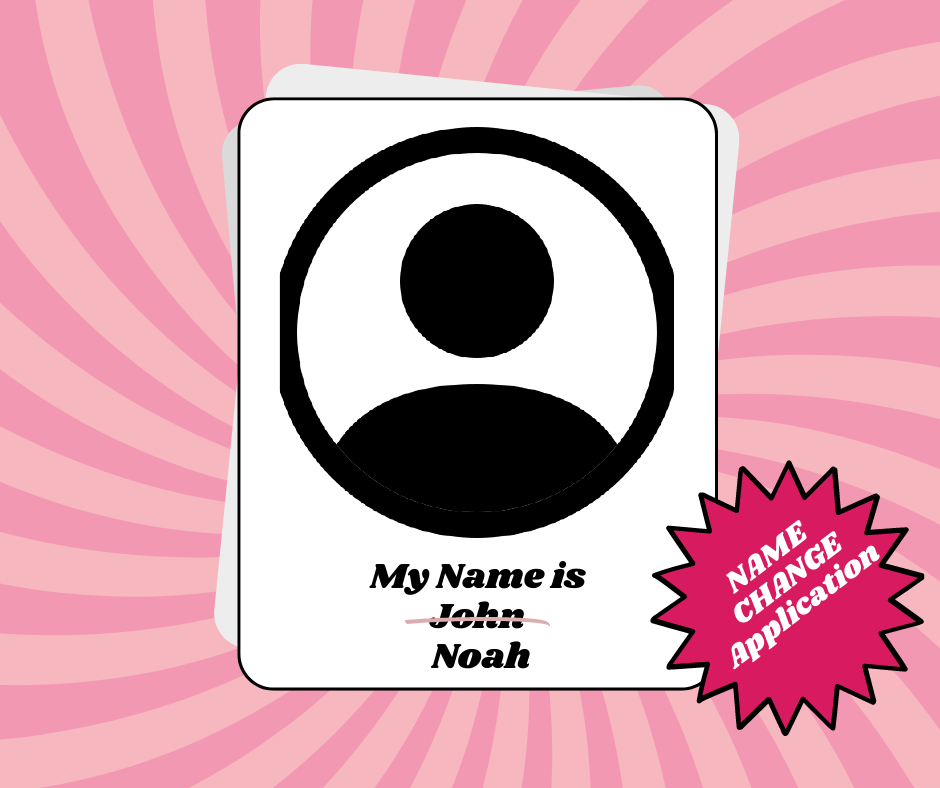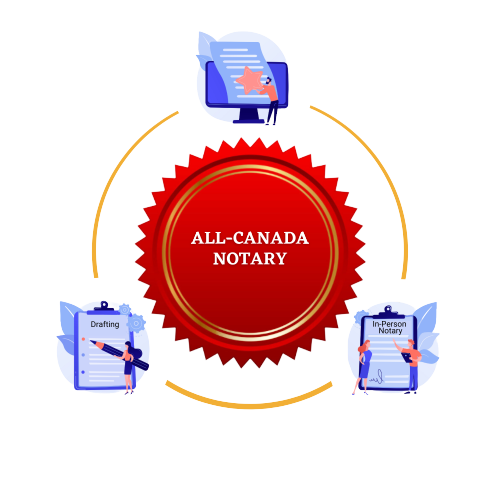Adoption in Ontario is a multi-step process, involving various legal and administrative steps. Throughout this journey, prospective parents will encounter numerous documents requiring authentication. These include birth certificates, financial records, and court forms such as the Affidavit of Adoption (Form 34D) and Affidavit of Adopting Relative or Stepparent (Form 34H). Notarization of these documents is crucial, ensuring their legal validity. Fortunately, many of these documents can now be processed online by All-Canada Notary, simplifying the procedure.

Types of Adoption in Ontario
In Ontario, there are four distinct types of adoption, each with its own unique characteristics and processes. Understanding these options is essential as you embark on your adoption journey:
1. Public Adoption:
- Agency: Children’s Aid Society (CAS)
- Cost: No fees; potential government financial assistance
- Timeframe: 6 months to 2 years or longer
- Children’s Profile: Older children, often from troubled backgrounds
Public adoption involves adopting a child through a government agency, primarily the Children’s Aid Societies (CAS). These children are typically in the care of CAS due to safety concerns, which may include issues such as neglect, abuse, or parental inability to provide a stable home environment.
One of the significant advantages of public adoption is that as an adoptive parent, you won’t incur any fees for the adoption process. However, it’s essential to be prepared for a potentially longer waiting period, as the process usually takes between 6 months to 2 years, or sometimes even longer, to be matched with a child. The goal of public adoption is to provide stable and loving homes for children who have faced challenging circumstances.
2. Private Adoption:
- Agency: Private adoption agencies or individuals approved by the Ministry of Children and Youth Services
- Cost: Approximately $15,000 to $25,000
- Timeframe: Varies based on birth parents’ selection
- Children’s Profile: Mostly newborns
Private adoption, sometimes referred to as domestic adoption, occurs when birth parents voluntarily choose to place their child for adoption. It is a popular choice for those looking to adopt infants. This type of adoption is facilitated through licensed adoption agencies or lawyers who specialize in adoption cases. Private adoption offers more control and flexibility to both birth and adoptive parents, as they have the opportunity to choose each other but may involve higher costs.
The cost associated with private adoption typically ranges from $15,000 to $25,000 for the adoption itself. Additionally, adoptive parents are required to cover expenses for a parent training program and a social worker to conduct a thorough home study.
Birth parents may select adoptive parents based on their preferences, values, and compatibility. Conversely, adoptive parents can learn about the child’s background and history, allowing them to make informed decisions. Private adoption can be an open or closed arrangement, depending on the parties’ preferences. In open adoptions, ongoing communication and contact between birth and adoptive families may be maintained, while closed adoptions involve limited or no contact.
3. International Adoption:
- Agency: Approved by the Ministry of Children and Youth Services
- Cost: $20,000 to $50,000
- Timeframe: Depends on the country of adoption
- Children’s Profile: Varies in age, often from orphanages
International adoption involves adopting a child from another country. This type of adoption requires adherence to both Canadian adoption regulations and the adoption laws and processes of the child’s home country.
Children available for international adoption can vary in age, and many of them have spent at least some time in orphanages or care facilities.
International adoption typically involves a rigorous and lengthy process, including immigration considerations, background checks, and sometimes travel to the child’s home country. It’s important to note that international adoption may come with cultural and logistical challenges, such as language barriers and adapting to the child’s cultural heritage.
The costs associated with international adoption can range from $20,000 to $50,000 or more. In addition to adoption expenses, adoptive parents are required to complete a parent training program and enlist a social worker to conduct a comprehensive home study.
4. Step-Parent Adoption:
- Process: Direct application to an Ontario court
- Cost: Varies based on legal fees
- Timeframe: Depends on court proceedings
- Children’s Profile: Related to the adoptive parent(s)
Step-parent adoption, sometimes called “family adoption,” is a unique form of adoption that allows a step-parent or relatives such as grandparent, aunt, uncle, great-aunt, or great-uncle to legally adopt a child in Canada. Unlike the other three types of adoption, you don’t need to work with a CAS or an adoption agency approved by the government to adopt a relative’s child if that child is living in Ontario.
Step-parent adoption typically requires the consent of the other biological parent or the termination of their parental rights by the court. It’s a process that reflects the commitment of the step-parent to fully embrace their role as a parent, providing love, care, and support to the child.
Unlike the other three types of adoption, you don’t need to work with a CAS or an adoption agency approved by the government to adopt a relative’s child if that child is living in Ontario. In family adoption, you can apply directly to an Ontario court for an adoption order. If the child lives in Ontario, the court holds a hearing to decide if it will allow the adoption.
Eligibility and Requirements
To proceed with the adoption process in Ontario, certain eligibility criteria must be met:
Age: Typically, you must be at least 18 years old to adopt in Ontario. This requirement ensures that adoptive parents are legally responsible adults capable of providing a stable environment for a child.
Residency: You can be a Canadian citizen or a permanent resident to adopt in the province. Residency requirements exist to ensure that adoptive parents have a connection to the community and can provide ongoing support to the child.
Financial Stability: You should have the financial means to support a child. This requirement aims to ensure that adoptive parents can provide for the child’s basic needs and offer a comfortable, nurturing environment.
Criminal Record Check: A clean criminal record is essential for prospective adoptive parents. This background check is conducted to ensure the safety and well-being of the child.
Mandatory Training and Home Study Except for family adoptions within Ontario, all other types require a mandatory parent training course (PRIDE) and a home study evaluation (SAFE). These steps ensure that prospective parents are well-prepared for the unique challenges of adoption.
The Application Process
Once you meet the eligibility criteria, you can begin the application process. This section outlines the key steps involved:
Choose the Adoption Route: Decide whether you want to pursue public, private, international, or step-parent adoption. Your choice will significantly impact the steps you need to follow.
Select an Adoption Agency: If opting for public adoption, you will work with a Children’s Aid Society (CAS). For private adoption, choose a licensed adoption agency or a lawyer specializing in adoption. The agency or lawyer will be your guide through the adoption process, helping you navigate the legal and procedural aspects.
Attend Information Sessions: Many adoption agencies require prospective parents to attend information sessions to learn more about the adoption process. These sessions provide an opportunity to ask questions and gain a better understanding of what to expect.
Complete the Application: Fill out the necessary paperwork provided by your chosen agency. The application typically includes personal information, background checks, references, and other relevant details.
Home Study: An assessment of your home and family environment is conducted to ensure it’s suitable for a child. It is conducted by an adoption social worker, assessing the suitability of prospective parents. It involves multiple interviews over several months, evaluating various aspects of the adoptive parents’ lives, including their values, experiences, and lifestyle.
Adoption Training: Attend mandatory adoption training sessions to prepare for parenthood and understand the challenges of adoption. Training covers a wide range of topics, from attachment and bonding to cultural sensitivity and trauma-informed care.
Match with a Child: In public adoption, you’ll be matched with a child by the CAS. In private adoption, you’ll work closely with the agency to find a suitable match. The matching process considers factors such as the child’s age, needs, and your family’s preferences.
Legal Aspects of Adoption
Adoption involves a legal process to finalize the placement of a child into your family. Here are the key legal aspects to consider:
Adoption Order: After a successful match, the court issues an adoption order, granting you legal custody and parental rights of the child. This order is a crucial legal document that establishes your relationship with the adopted child.
Consent: In private adoption, birth parents provide consent for the adoption, which must be signed in front of a lawyer or notary public. Consent is a legal requirement to ensure that birth parents are fully aware of their decision and have the opportunity to seek legal counsel.
Post-Placement Supervision: After the child is placed with you, there is a period of post-placement supervision to ensure the child’s well-being. Social workers or adoption professionals will conduct visits to assess the child’s adjustment and provide support if needed.
Finalization: Once all legal requirements are met, the adoption is finalized, and a new birth certificate is issued for the child with your name as the parent. Finalization marks the official and permanent establishment of your family through adoption.
Financial Considerations
Adoption comes with various costs, depending on the type of adoption you choose. These costs may include agency fees, legal fees, counseling fees, and more. However, it’s important to note that financial assistance and tax credits may be available to help offset some of these expenses.
Emotional Preparation
Adopting a child is an emotional journey. It’s essential to prepare yourselves emotionally for the challenges and joys that come with parenthood through adoption. Seek support from adoption support groups and therapists if needed.
Role of Notary Public in Adoption
A notary public plays a crucial role in the adoption process, primarily when it comes to notarizing documents and affidavits. Notarization is a formal process where a notary public verifies the authenticity of signatures on legal documents, ensuring that they are legitimate and were signed voluntarily. In adoption, the following documents may require notarization:
Form 34D: Affidavit of Adoption Applicant(s): This essential document is required for public, private, or international adoption, and it must be notarized! The Affidavit of Adoption Applicant(s) serves as a sworn or affirmed statement, confirming adoptive parents’ intention to adopt the child and their commitment to fulfilling the legal obligations of adoption.
Form 34H: Affidavit of Adopting Relative or Stepparent: This affidavit is specifically required for family adoptions in Ontario, and it must also be notarized! When a relative or step-parent is adopting a child, the Affidavit of Adopting Relative or Stepparent attests to the adoptive parent’s relationship with the child and their commitment to providing care and support.
How Can All-Canada Notary Help?
All-Canada Notary offers affordable and quick online and in-person notarization services for adoption forms like Form 34H and Form 34D, facilitating a smoother adoption process. Book your appointment today.
Frequently Asked Questions (FAQs) About Adoption in Ontario
- What are the different types of adoption available in Ontario? There are four main types of adoption in Ontario: Public, Private, International, and Step-Parent Adoption.
- What is the cost range for private adoption in Ontario? Private adoption costs typically range from $15,000 to $25,000.
- How long does the public adoption process take? The public adoption process can take anywhere from 6 months to 2 years or longer.
- Are there any fees associated with public adoption? No, there are generally no fees for public adoption, with potential government financial assistance available.
- Can I adopt a child from another country through international adoption? Yes, international adoption allows you to adopt a child from another country.
- What is involved in the step-parent adoption process in Ontario? Step-parent adoption involves applying directly to an Ontario court and may require consent from the other biological parent.
- What are the eligibility criteria for adopting a child in Ontario? Eligibility criteria include being at least 18 years old, Canadian citizenship or permanent residency, financial stability, and a clean criminal record.
- What is a home study, and why is it important? A home study is an assessment of your home and family environment conducted by a social worker to ensure suitability for a child.
- How does the matching process work in adoption? In public adoption, you’ll be matched with a child by the CAS, while in private adoption, you’ll work with the agency to find a suitable match.
- What legal documentation is needed to finalize an adoption? An adoption order issued by the court is required to grant legal custody and parental rights of the child.
What is the average timeframe for completing an adoption in Ontario? The timeframe for adoption varies depending on the type of adoption. Public adoptions typically take 6 months to 2 years, private adoptions depend on birth parents’ selection, international adoptions depend on the country’s process, and step-parent adoptions depend on court proceedings.
Are there any financial assistance programs available for adoptive parents in Ontario? Financial assistance may be available for public adoptions through government programs. Private and international adoptions generally do not offer financial assistance, but adoptive parents can explore loans, grants, or employer benefits that may be available.
Can single individuals adopt a child in Ontario? Yes, single individuals are eligible to adopt in Ontario, provided they meet all the necessary criteria, including age, residency, financial stability, and a clean criminal record.
How does the home study process work in Ontario? The home study is conducted by an adoption social worker and involves multiple interviews over several months. It assesses the suitability of the prospective parents’ home environment, lifestyle, values, and experiences.
What is the role of adoption agencies or lawyers in the adoption process? In private adoptions, agencies or lawyers guide adoptive parents through legal and procedural aspects, including paperwork, home studies, and matching with a child. In public adoptions, Children’s Aid Societies play a similar role.
- Can Form 34D: Affidavit of Adoption Applicant(s) and Form 34H: Affidavit of Adopting Relative or Stepparent be notarized online? Yes, these forms can typically be notarized online.


